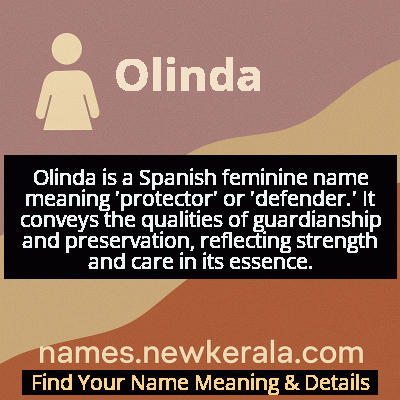Olinda Name Meaning & Details
Origin, Popularity, Numerology Analysis & Name Meaning of Olinda
Discover the origin, meaning, and cultural significance of the name OLINDA. Delve into its historical roots and explore the lasting impact it has had on communities and traditions.
Name
Olinda
Gender
Female
Origin
Spanish
Lucky Number
1
Meaning of the Name - Olinda
Olinda is a Spanish feminine name meaning 'protector' or 'defender.' It conveys the qualities of guardianship and preservation, reflecting strength and care in its essence.
Olinda - Complete Numerology Analysis
Your Numerology Number
Based on Pythagorean Numerology System
Ruling Planet
Sun
Positive Nature
Leaders, ambitious, highly driven, self-reliant, innovative.
Negative Traits
Overly aggressive, domineering, impatient, selfish.
Lucky Colours
Red, orange, gold.
Lucky Days
Sunday.
Lucky Stones
Ruby, garnet.
Harmony Numbers
2, 3, 9.
Best Suited Professions
Entrepreneurs, managers, engineers.
What People Like About You
Courage, determination, leadership.
Famous People Named Olinda
Olinda Bozán
Actress and comedian
Prominent Argentine actress known for her work in theater and film during the Golden Age of Argentine cinema
Olinda Salguero
Social activist and politician
Guatemalan activist recognized for her work in human rights and social development programs
Olinda Castañeda
Educator and writer
Influential Mexican educator who contributed to educational reforms and women's literacy
Name Variations & International Equivalents
Click on blue names to explore their detailed meanings. Gray names with will be available soon.
Cultural & Historical Significance
In Spanish-speaking communities, Olinda carries connotations of elegance and tradition, often chosen by families seeking to honor their cultural roots while maintaining a distinctive feminine identity. The name's meaning of 'protector' aligns with cultural values of family guardianship and community preservation that are central to Hispanic family structures. Throughout history, women named Olinda have often been remembered as matriarchal figures who maintained family traditions and provided stability during times of change.
Extended Personality Analysis
Women named Olinda are typically perceived as strong, nurturing individuals with a natural protective instinct. They often exhibit a calm, steady demeanor combined with remarkable inner strength, making them reliable pillars in their families and communities. Their protective nature extends beyond physical safety to emotional support and guidance, often taking on roles as mediators and caretakers.
Olindas tend to be deeply intuitive and empathetic, able to sense when others need support or protection. They balance traditional values with modern sensibilities, often serving as bridges between generations while maintaining their own strong sense of identity and purpose. Their strength is typically quiet rather than overt, expressed through consistent support and unwavering loyalty to those they care about. This combination of gentle nurturing and firm protection makes them particularly effective in roles that require both compassion and resilience.
Modern Usage & Popularity
In contemporary times, Olinda maintains a steady though uncommon presence in Spanish-speaking communities. While not among the most popular names, it enjoys consistent usage particularly in Brazil, Spain, and Latin American countries where traditional names are valued. The name has seen a slight resurgence among parents seeking unique yet culturally significant names that honor heritage without being overly common. Modern usage often combines Olinda with more contemporary middle names, bridging traditional and modern naming conventions. Its rarity in English-speaking countries makes it an appealing choice for families wanting a distinctive name with deep cultural roots and meaningful symbolism, while its easy pronunciation across languages adds to its cross-cultural appeal.
Symbolic & Spiritual Meanings
Symbolically, Olinda represents the concept of sacred protection and preserved beauty. The name evokes images of walled cities safeguarding their treasures, ancient guardians watching over precious traditions, and the enduring strength of cultural heritage. Metaphorically, it suggests someone who serves as a living repository of family history and values while actively protecting what matters most. The symbolism extends to natural protection as well, reminiscent of ancient olive trees that withstand time while providing shelter and sustenance. Olinda embodies the idea of gentle strength - not aggressive defense but rather the quiet, persistent protection that allows beauty and tradition to flourish safely across generations, making it a powerful symbolic representation of cultural continuity and familial devotion.

